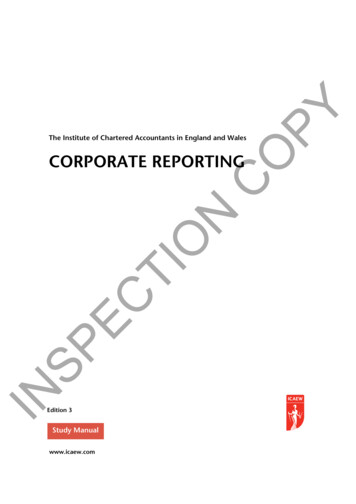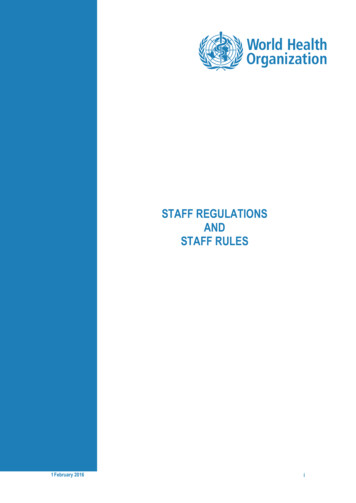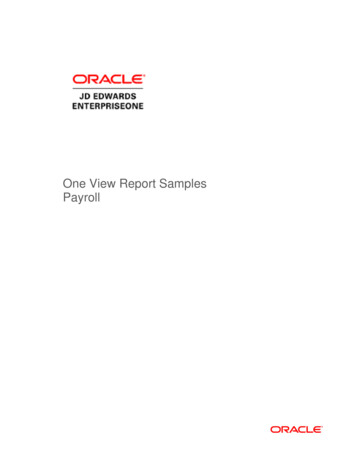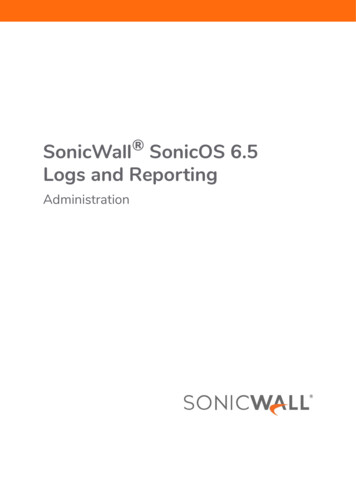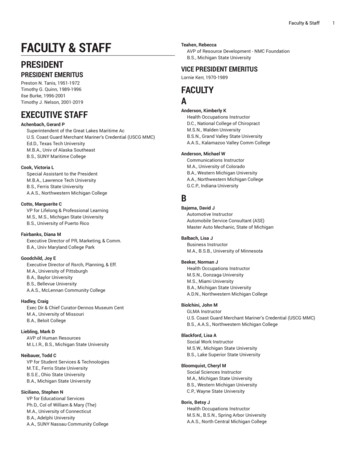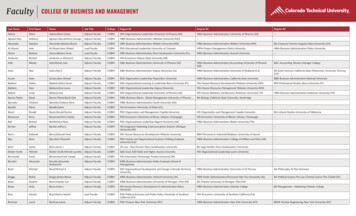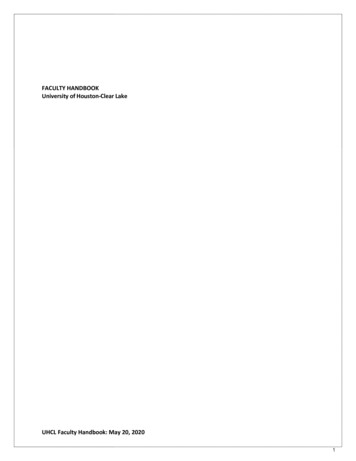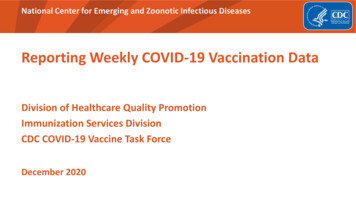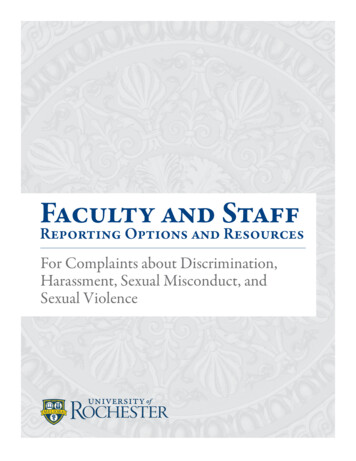
Transcription
Faculty and StaffReporting Options and ResourcesFor Complaints about Discrimination,Harassment, Sexual Misconduct, andSexual ViolenceUniversity of Rochester Faculty and Staff Reporting Options and Resources1
ContentsIntroduction 3First Steps 32Talk to Someone: Confidential Resources5Reporting Discrimination or Harassment6Questions?9Appendices10
IntroductionFirst StepsThe University of Rochester is committed to the health andsafety of every member of our community and to creating anenvironment where everyone is treated with dignity and respect.Your safety is the number-one priority. If you haveexperienced physical or sexual violence, get to a safe place andseek help. You are not alone. There are many people who canprovide medical and emotional support, regardless of whetheryou choose to pursue criminal proceedings and/or file acomplaint with the University.If you have experienced sexual misconduct, the decision to seeksupport is a personal one. Whether or not you choose to do so isentirely up to you. This guide provides information and resourcesavailable at the University of Rochester and beyond for facultyand staff who have experienced sex or gender discrimination,sexual misconduct, sexual harassment, sexual assault, stalking,and dating and domestic violence (also known as intimatepartner violence). This information is also available online atrochester.edu/sexualmisconduct.If you believe that you have been discriminated against becauseof your age, color, disability, ethnicity, military/veteran status,national origin, race, religion or creed, or on the basis of anyother protected class, see options for reporting “ReportingDiscrimination or Harassment ” at the University on page 6.If You Need Emergency Assistance(24-Hour Response) Call the University’s Department of Public Safety (DPS)at (585) 275-3333. Dial #413 on campus blue phones. Call 911 (Police Dispatch, Monroe County EmergencyCommunications).Seeking Medical TreatmentIt’s important to get care as soon as possible. Even if you feelokay, you may have hidden injuries or need to explore optionsfor preventing pregnancy or STDs. Drugs used for emergencycontraception and to prevent STDs have a limited timeframewithin which to work. In addition to receiving medicalattention, clinicians can assist you in collecting forensicevidence. You do not need to file a report to receive medicalservices.It’s important to know that A friend may accompany you to the emergency department. You may request a counselor from RESTORE, a localrape crisis service agency, to meet you at the emergencydepartment to offer support. Call RESTORE at (585)546-2777. Emergency contraception, also known as “Plan B” or “themorning-after pill,” is available for purchase without aprescription at University Health Service. An appointmentis not needed.University of Rochester Faculty and Staff Reporting Options and Resources3
In Rochester, medical treatment is available atCollecting Physical Evidence University Health Servicewww.rochester.edu/uhsCollecting physical forensic evidence—hairs, fluids, fibers—within 72 hours of an assault helps preserve your right todecide at a later date whether you wish to go forward withthe criminal justice system and/or file a complaint under theUniversity’s process. You do not need to decide whether youwant to make a report about the incident immediately, but youdo need to have the evidence collected as quickly as possible. River Campus(585)273-2662UHS Building, 738 Library Rd., First Floor Medical Center(585) 275-2662250 Crittenden Blvd., Room 1-5077 Eastman School of Music:(585) 274-1230Student Living Center, 26 Gibbs St., Room 106 Strong Memorial Hospitalurmc.rochester.edu(585) 271-2100601 Elmwood Ave.Sexual Assault Nurse Examiners are available. Rochester General Hospitalrochesterregional.org(585) 922-40001425 Portland Ave.Sexual Assault Nurse Examiners are available. Highland Hospitalurmc.rochester.edu/highland(585) 473-22001000 South Ave.For individuals who do not have medical insurance or maynot want family to learn about an emergency room visit, theNew York State Office of Victim Services may be able to assistwith the cost of medical services related to sexual violence.For information, call (800) 247-8035 or visit ovs.ny.gov/help-crime-victims.Sexual Assault Nurse Examiners (SANE)Strong Memorial Hospital and Rochester General Hospitalhave certified Sexual Assault Nurse Examiners (SANE) onstaff. These registered nurses have received special training andcan provide comprehensive care to sexual assault patients in asensitive, nonthreatening manner. In addition, they are able toconduct a forensic exam and may provide expert testimony if acase goes to trial.4The Rape, Abuse and Incest National Network (RAINN)advises that you—if you are able—try to avoid disturbing ordiscarding evidence that might have your attacker’s DNA onit before you seek medical care. Do not urinate or defecate;shower, bathe, or douche; brush your teeth or gargle; brushyour hair; or throw away clothes worn during the attack.Taking these steps can be very difficult following a traumaticexperience, but doing so will help preserve potential evidenceshould you decide to make a report. You can still have an examperformed even if you have done one of these activities, suchas showering. You may want to bring a change of clothes whenyou go to the hospital or health facility for the exam.Preserving Other Kinds of EvidenceIt is also important to save other types of evidence, such asvoicemails, emails, text messages, social media posts, videos,photos, letters, and computer screen shots, which can behelpful in building a case, should you decide to make a report.
Healing through Education, Advocacy,and Law (HEAL)Headquartered within Strong Memorial Hospital, theHEAL Collaborative offers people who have experiencedinterpersonal violence access to physical and mental healthservices, as well as legal and social support, all in one place.Services include safety planning, linkages to emergency shelter,social work consultation and comprehensive needs assessment,short-term mental health support, assistance in filing petitionsfor temporary orders of protection and other legal matters, andreferrals to community resources.HEAL Collaborators include Willow Domestic ViolenceCenter, RESOLVE of Greater Rochester, the Legal AidSociety of Rochester, the Rochester Police Department VictimAssistance Unit, Lifespan, and Monroe County Family Court,which can provide remote access to temporary orders ofprotection to clients in need.Talk to Someone:Confidential ResourcesIndividuals at the following University offices and localorganizations offer confidential support. Confidentialresources will not report crimes to law enforcement and arenot authorized to investigate on behalf of the University. Inspecific instances, such as a health or safety emergency, theseprofessionals may be required to report your information toexternal authorities.University Resources Employee Assistance Program (EAP)urmc.rochester.edu/eap(585) 475-0432496 White Spruce Blvd.EAP is a free service that provides employees and familymembers of the University the opportunity to discusspersonal or work-related problems with a professionalcounselor 24 hours a day. A satellite office for EAP is atUR Medicine Strong West, 156 West Ave., Brockport, NY,14420.NonprofessionalCounselors and Advocates University 5) 275-4321500 Wilson Blvd.Rochester-Area Resources RESTORE Sexual Assault Servicesrestoresas.org(585) 546-2777Free and confidential crisis intervention and supportto survivors of sexual assault, available 24 hours a day.RESTORE holds office hours on River Campus everyMonday and Thursday from 9 a.m. to 5 p.m. in Taylor Hall,Room 01.University of Rochester Faculty and Staff Reporting Options and Resources5
Willow Domestic Violence Centerwillowcenterny.org(585) 222-7233 (222-SAFE)Confidential help for women and men of all ages, available24 hours a day. Assistance with emergency shelter, safetyplanning, counseling, court advocacy, transitional supportservices, and prevention education.National Resource RAINN (Rape, Abuse and Incest National Network)rainn.org24-hour hotline: (800) 656-4673For additional resources on and off campus, visit Discrimination orHarassmentSexual harassment, sexual misconduct, and sexual violenceare forms of sex discrimination under the University’s Policyagainst Discrimination and Harassment, also known as Policy106 pdf.Also under Policy 106, discrimination or harassment based onone’s age, color, disability, ethnicity, marital status, military/veteran status, national origin, race, religion or creed, or on thebasis of any other protected class is strictly prohibited.If you have experienced discrimination and/or harassment, youmay submit a complaint to any of the following individuals oroffices: Your department chair, dean, director, or immediatesupervisor Office of Human Resourcesrochester.edu/working/hr River Campus(585) 275-874733A Wallis Hall Medical Center(585) 276-6817URMC 1 6039 Office of Staff Diversity and Inclusionrochester.edu/eoc(585) 275-2200910 Genesee St., Suite 100 Office of the University Intercessorrochester.edu/intercessor(585) 275-912536 Wallis Hall Office of Counselrochester.edu/counsel(585) 273-2167236 Wallis Hall6
University Public Safetypublicsafety.rochester.edu(585) 275-3333 River Campus500 Joseph C. Wilson Blvd. Medical Center601 Elmwood Ave. Eastman School of Music26 Gibbs St.Individuals in these offices will maintain your privacy, but theyare not confidential resources. Information will be relayed onlyas necessary to investigate and/or seek a resolution.Please note that if your complaint involves sexual assault,stalking, or dating or domestic violence, you have the rightto have an advisor present when speaking with anyone at theUniversity regarding your complaint. This can be a friend,family member, or anyone of your choosing.Reporting OptionsYou have several options for reporting a complaint. A verbalcomplaint can be made with any of the offices listed above. Youcan also make a written report. The form is available from anyof the offices listed above, or you can obtain a copy of the formonline at equest formal resolution.pdf.Regardless of how the report is made, the University willneed sufficient information to understand the nature of thecomplaint, such as: the name of the person (or persons) making the complaint the name of the person (or persons) against whomallegations are being made identification of the protected class (or classes) involved a detailed description of the actions or behaviors at issue,including dates, times, and locations of events the names of any witnesses to the actions or behaviorThe more complete the information provided, the better ablethe University will be to investigate and respond effectively.University of Rochester Faculty and Staff Reporting Options and ResourcesAccommodations and Interim MeasuresIf you have experienced sexual misconduct, there are stepsthe University can take to accomodate you. This includesplacing persons on temporary leaves of absence; exclusion fromprograms and facilities; altering working, learning, patient care,or living arrangements; or imposing other conditions in theUniversity environment as warranted.The University can also issue Active Avoidance Orders,which limits contact between two or more individuals whoare engaged in an interpersonal conflict. An AAO is notconsidered disciplinary action and may be imposed prior to aformal investigation. In addition, the University can assist youwith obtaining an order of protection or initiating family orcivil court proceedings.Formal InvestigationA formal investigation into a complaint of discrimination orharassment can arise from either a verbal or written complaint.When you make a formal complaint, you are the complainantin the case. The person or persons against whom you have madethe claim is/are the respondent(s).If the University initiates a formal investigation, an investigatorwill interview you and other witnesses with knowledge ofyour complaint and will attempt to complete any investigationwithin 30 to 45 days. While the privacy of all parties will beprotected, confidentiality cannot be guaranteed.When the investigation is complete, a written report is sentto the adjudicator of your complaint. A list of these decisionmakers can be found in Policy 106, Appendix B. For example,if the complaint is against a faculty member, the adjudicatorwho determines the outcome will be the dean of the schoolwhere the faculty member holds their primary appointment.Within 15 business days of receiving the report, the personadjudicating the complaint determines whether a violationof Policy 106 has been established and sends a writtendetermination to you, the respondent, and any appropriateadministrative personnel. The determination will include asummary of the findings of the investigation and describe anycorrective action to be taken, as well as other recommendationsbased upon the findings. In certain cases, an investigator maydetermine that an informal resolution will be the most effectiveway to remedy a concern (see Informal Resolution on page 8).7
In addition to receiving a copy of the written determinationletter, the complainant and the respondent may also make anappointment to view a copy of the investigator’s written report,but may not take a copy with them.Either party can appeal this decision within 15 business days.Burden of ProofIn deciding the outcome of a complaint, Universityadjudicators are guided by “a preponderance of the evidence”standard. This means that in determining whether a respondentis responsible, the proof need only show that it is more likelythan not that the alleged behavior occurred and violated aprovision of Policy 106.Informal ResolutionThe option to seek an informal resolution is always open toyou. If an informal resolution is unsuccessful, you may still filea written report and seek a formal investigation, should theproblem continue.Informal resolutions can take many forms. You may choose to Directly confront the person who is the source of theunwelcome behavior. This can be done either in person orin writing, letting the individual know that the behavior isunwelcome and must stop. Engage a third person—such as a supervisor, departmentchair, dean, HR Business Partner, or the UniversityIntercessor—to address the conduct with the source of theunwanted behavior. Participate in a conflict resolution process with theUniversity Intercessor.Whatever method of informal resolution you choose to pursue,the goal for the University is identical to the goal of a formalinvestigation—to stop the unwanted behavior and to takesteps to address your concerns. Under Policy 106, all effortsat informal resolution need to be reported to the Office ofCounsel so they have a record of the effort and any follow-upmeasures taken.8Privacy and ConfidentialityAn allegation of harassment, discrimination, or retaliationbrought to the attention of the University will be discretelyaddressed. The University will keep private information aboutpersons reporting and persons against whom reports are made,but confidentiality cannot be guaranteed. The investigation ofcomplaints may require disclosure to the respondent and towitnesses for the purposes of gathering relevant information.Disclosure is limited to individuals involved in investigatingand adjudicating complaints, those responsible for follow-upactions in response to a report or investigation (including,if appropriate, the University Committee on Tenure andPrivileges), and administrative personnel who need to beinformed.If there is a proceeding outside of the University, such asa lawsuit or a complaint to a state or federal agency, theUniversity may be required to share documents or informationrelated to the investigation, including the identity of witnesses,with outside officials or parties to the lawsuit.Protection from RetaliationRetaliation is illegal and will not be tolerated. The Universityprohibits retaliation against any person who complains of oropposes perceived unlawful discrimination or harassment,including those who participate in any investigation orproceeding involving a claim based on a protected class.Retaliation violates Policy 106, and allegations of retaliationshould be reported and will be addressed.Witnesses in a Policy 106 InvestigationA witness in a Policy 106 investigation is anyone who hasinformation related to the complaint. This can be directknowledge, such as an eyewitness account of an incident,or indirect information, such as something overheard orsomething stated by another person.As a witness, you may be asked to speak to an investigator.This request does not mean you have been accused of anywrongdoing but simply that you may have informationthat could be relevant and helpful to the investigation. TheUniversity encourages you to participate in this process and tobe truthful and forthcoming.
Witness ConfidentialityRetaliationAny statement that you provide to an investigator will be keptprivate, but confidentiality is not guaranteed. The investigator’snotes or your written statement will not be shared withother witnesses, the complainant, or the respondent. Theinvestigator may, however, use information you provide as thebasis for further investigation, and it may be discussed in theinvestigator’s report. If you wish to remain anonymous (fromthe complainant, the respondent, and the person adjudicatingthe complaint), you can discuss this with the investigator, andyour identity will be protected to the extent possible.Respondents in a Policy 106 investigation have an obligationnot to take any adverse or retaliatory action against thecomplainant or any witnesses in the investigation. This caninclude making inquiries of individuals as to whether or notthey have been interviewed and what statements they may havemade to the investigator. Any behavior that could be perceivedas intimidating to witnesses or the complainant could result indisciplinary measures for the respondent.Respondent Rights and ResourcesIf you are accused of discrimination, harassment, or retaliationin violation of Policy 106 (if you are the “respondent”), youwill be contacted by an investigator. The investigator willarrange for an in-person meeting, where you will be informedof the nature of the complaint against you and given anopportunity to respond.Support for RespondentsRespondents in a Policy 106 investigation have the right to betreated respectfully and will not be presumed to have engaged inany wrongdoing while the investigation is ongoing. In addition,if the complaint raises allegations of sexual assault, stalking,or dating or domestic violence, you have the right to bring anadvisor with you to the meeting with the investigator. This canbe a friend, family member, or anyone of your choosing. Youmay also make use of the Employee Assistance Program (EAP)at (585) 475-0432 or urmc.rochester.edu/eap.aspx if you are inneed of personal support during the Policy 106 process.Confidentiality for RespondentsAny statement that you provide to an investigator throughoutthe investigation will be kept private but is not confidential. Theinvestigator’s notes or your written statement will not be sharedwith other witnesses or with the complainant. If it is determinedthat you have violated Policy 106, a copy of the determinationletter will be included in your central University personnelfile, and the complainant will be notified of this finding.However, if it is determined that you have not violated Policy106, no reference to the investigation will be included in yourpersonnel file, unless you have been counseled or disciplinedas a consequence of the complaint and the investigation. Thecomplainant will also be notified of this finding.University of Rochester Faculty and Staff Reporting Options and ResourcesWhen an Incident Does NotViolate Policy 106Sometimes a person’s behavior, while offensive or upsetting,does not violate a provision of Policy 106. When behavior runscounter to the University’s culture of respect or violates a policyother than Policy 106, the University may, for example, counselan employee, require an employee to undergo additionaltraining, or impose some form of corrective discipline.Full Text of Policy 106This document highlights aspects of the University’s Policyagainst Discrimination and Harassment, also known asPolicy 106. However, the policy itself provides greater detailand is available online as a PDF file and can be read in full,downloaded, and/or printed. The full text of Policy 106can be found online: pdf.Questions?Questions about Policy 106 can be directed to the Office ofHuman Resources, the Office of the University Intercessor, theOffice of Counsel, or the Title IX Coordinator.9
AppendicesA. DefinitionsThe following definitions can be found in the University’sPolicy against Discrimination and Harassment (Policy 106).They apply to interactions with faculty and staff. Thesedefinitions may not apply to the investigation of complaintsunder Title IX.Discrimination involves an adverse action or decision orharassing treatment of a person or class of persons becauseof a legally protected status (e.g., age, gender, race, etc.) orbecause of perceived or actual affiliation/association with otherindividuals in a protected class. Discrimination under Policy106 does not include unfair or inappropriate behavior notbased on a protected class; for instance, complaints involvingprofanity or name calling not related to a protected class orissues of nepotism must be addressed through other avenues(e.g., Human Resources, your supervisor, the Intercessor).Gender expression refers to external characteristics andbehaviors that are socially defined as masculine or feminine(manner of dress, grooming, mannerisms, etc.).Gender identity refers to a person’s innate, deeply feltpsychological identification as male or female.Harassment is a form of discrimination which involves (1)unwelcome verbal, written, physical or electronic conduct, (2)that is intended to cause or which could reasonably be expectedto cause an individual or group to feel intimidated, demeaned,abused, or fearful or to have concern for their personal safety,(3) because of a protected class when the conduct is(a) sufficiently severe or pervasive (meaning that theconduct is either of an extraordinarily severe or egregiousnature or has been repeated with sufficient frequency and/or continuity); in other words, typically, a single offenseor occasional, episodic instances of offensive behavior willnot qualify as sufficiently severe or pervasive, but a singleinstance of severe egregiousness (e.g., sexual assault) would,and(b) objectively and subjectively has the effect of (1)unreasonably interfering with an individual’s work or equalaccess to education or (2) creating an intimidating, hostile,or offensive work or academic environment.10All of these requirements must be met for certain behavior toqualify as harassment, and a finding of hostile environmentmust be based on a totality of the facts and circumstances.Types of behaviors based on a protected class which can lead toclaims of harassment include degrading and derogatory words,graffiti, pictures, jokes, epithets, statements, or stereotypingactivities as well as other forms of verbal, visual, or writtenmessages of intimidation as well as unwanted physical contactor comments or threats about physical contact and stalking.Protected status or protected class refers to any of thecategories listed in the Equal Opportunity and the AntiDiscrimination and Anti-Harassment Policy Statements.Retaliation is adverse action taken against an individualby the University because the individual has (1) personallycomplained of or opposed perceived discrimination orharassment because of a protected class; (2) testified, assisted,or participated in an investigation, proceeding, hearing, orlegal action involving a claim of discrimination or harassmentbased on a protected class; (3) exercised rights under a relevantstatute which involves a protected class and/or action taken bythe University which would dissuade a reasonable person fromengaging in these types of protected activities.Sexual harassment is a form of prohibited harassment asdefined above in Harassment. The requirements of parts(a) and (b) listed therein apply. Sexual harassment involvesunwelcome sexual advances or requests for sexual favors orother verbal or physical acts/conduct of a sexual or sex-basednature when1. submission to such conduct is made either explicitlyor implicitly a term or condition of an individual’semployment or academic success;2. submission to or rejection of such conduct by anindividual is used as the basis for an employment oracademic decision affecting such individual; or3. such conduct has the purpose or effect of unreasonablyinterfering with an individual’s work or academicperformance or creates an intimidating, hostile, oroffensive working or academic environment.
Sexual assault is sexual harassment which includes any physicalsexual act perpetrated against a person’s will, where that persondoes not give clear and voluntary consent or where that personis incapable of giving consent due to drug or alcohol use or dueto intellectual or other disability. Sexual assault includes butis not limited to rape, sexual battery, sexual coercion (the actof using pressure or force to have sexual contact with someonewho has already refused), and any other act of sexual violence.Depending upon the severity or pervasiveness of the conduct,the following behaviors may lead to complaints of sexualharassment or constitute sexual harassment (some of whichconstitute criminal acts) and should be avoided: unwanted comments about an individual’s body, clothing,or lifestyle that have sexual implications or demean theindividual’s sexuality or gender unwanted sexual flirtations (including leering or ogling) unwanted sexual advances and propositions unwanted display of sexual or sexually demeaning objects,pictures, or cartoons in areas visible to other members ofthe University community (including but not limited tocomputer screens and bulletin boards) threats or insinuations that an individual’s refusal orwillingness to submit to sexual advances will affect theindividual’s status, evaluation, grades, wages, advancement,duties, or career development unwanted and intentional sexual touching, patting,pinching of, or brushing against another’s body or clothing stalking, whether in person, telephonic, or electronic innature; domestic violence; dating violence; sexual assault;or rapeB. Other Important PoliciesConflicting Relationships Policy (Nepotism)(Policy 121.pdfFaculty and Student HandbooksStudent Sexual Misconduct udentSexualMisconductPolicy.pdfStandards of Student Conduct /standardsstudentconduct.pdfFaculty Handbook (May 2017)rochester.edu/provost/assets/PDFs/Faculty handbook.pdfThe University’s Faculty Intimate Relations Policy can be foundon page 11.School of Medicine and Dentistry Regulations of the Faculty(October facultyregulations.pdfGraduate Student Regulations and University Policies(August tions.pdfSchool of Nursing Student Handbook .pdfSchool of Medicine and Dentistry Student ate Resident Handbook ( July esidentHandbook.pdfUniversity of Rochester Faculty and Staff Reporting Options and Resources11
Produced by University CommunicationsSeptember 9, 20193258-PDF-919
Sep 09, 2019 · environment where everyone is treated with dignity and respect. If you have experienced sexual misconduct, the decision to seek support is a personal one. Whether or not you choose to do so is entirely up to you. This guide provides information and resources availa
